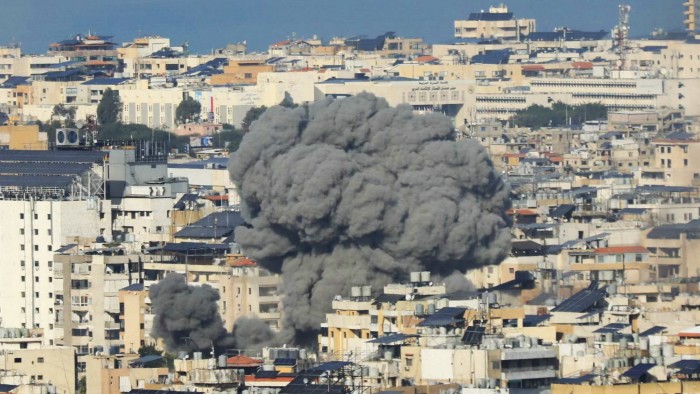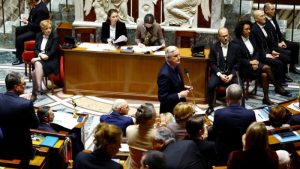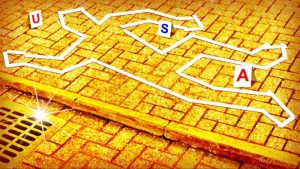Lebanon is studying US-drafted ceasefire proposal, official says

Unlock the Editor’s Digest for free
Roula Khalaf, Editor of the FT, selects her favourite stories in this weekly newsletter.
Lebanon is studying a US-drafted ceasefire proposal which aims to halt the war between Israel and militant group Hizbollah, the country’s officials have said.
A Lebanese government official said the US proposal was for an initial 60-day ceasefire and was based on Resolution 1701 — the UN Security Council resolution which ended the 2006 war between Israel and Hizbollah but was never properly implemented.
The resolution calls for the disarmament of the Iran-backed militant movement in areas south of the Litani river, which runs about 30km from Lebanon’s southern border, as well as the withdrawal of Israeli troops from Lebanese territory.
The proposal, which was delivered to Beirut this week, does not include giving the Israeli military freedom of movement or permission for the deployment of foreign forces inside Lebanon, other than the UN peacekeepers who already patrol the Lebanon-Israel border, the official said. Lebanese officials had previously warned that Israeli freedom of movement was a non-starter for Beirut.
The omission of Israel’s demand to be able to unilaterally enforce a ceasefire means Lebanon may be more likely to agree to the new draft, although it is not clear if Israel has abandoned the requirement.
On Friday Lebanon’s long-serving parliamentary speaker Nabih Berri, whose party is allied with Iran-backed Hizbollah, said in an interview with Saudi Arabian newspaper Al-Sharq Al-Awsat: “There can be no undermining of our sovereignty.”
Berri leads the Amal Movement which has close ties with Hizbollah, and he is considered to be negotiating on their behalf.
“[Benjamin] Netanyahu resorts to force when he wants a concession,” Berri told Al-Sharq Al-Awsat on Friday. “But he doesn’t know who he is dealing with, and such actions don’t work with us.”
According to the Lebanese government official, the US proposal also includes a “special mechanism” for implementing Resolution 1701 involving a task force drawn from several countries to provide support to the Lebanese army, which according to the resolution is supposed to be the only armed force in Lebanese territory south of the Litani river other than the UN peacekeepers.
The countries which would participate in this task force have not been publicly identified but would be announced if the peace deal is signed, the official said.
Many Lebanese politicians remain deeply distrustful of Israel’s intentions and sceptical about the prospects for a ceasefire. Another Lebanese official said on Friday that the chances for reaching an agreement were “below zero”.
The FT cannot verify whether Berri’s public comments accurately reflect the latest draft proposal. The text of the agreement has not been made public, and Israeli officials have not officially commented on the contents of the proposal.
A person familiar with the Israeli government’s thinking said that Ron Dermer, Israeli strategic affairs minister and a close confidant of Netanyahu, had visited Moscow, Washington and US president-elect Donald Trump’s Florida residence Mar-a-Lago this week to discuss the terms of a possible ceasefire deal in Lebanon.
“Understandings were reached” with the administration of US President Joe Biden as well as Trump, the person added.
Israel had previously demanded that resolution 1701 be strengthened, and that it should be granted the right to use force if the agreement’s terms were violated.
Netanyahu said earlier this month that a deal would have to restrict Hizbollah to areas north of the Litani River, stop the group’s rearmament and allow Israel to “act vigorously” against any threat.
Israel has stepped up its attacks across Lebanon in recent days, including launching four waves of air strikes on Beirut’s southern suburbs on Friday.
Additional strikes were reported on Saturday in Dahiyeh, where Hizbollah’s headquarters are based. Israeli military officials have in recent days threatened to expand their ground offensive in south Lebanon.
Hizbollah began to fire rockets towards Israel after Hamas’ deadly attack on Israel on October 7 last year. As a consequence of the Hizbollah attacks 60,000 Israelis in the country’s north have been evacuated from the area, according to Israel’s government.
The Israeli military intensified its campaign against Hizbollah two months ago by blowing up thousands of pagers and walkie-talkies belonging to Hizbollah members, and ramping up air strikes. Two weeks later it began an invasion of southern Lebanon and pounded areas of south and east Lebanon dominated by Hizbollah.
More than 1mn people have been forced to flee their homes and 3,445 people have been killed since October 8 last year, the majority in the last eight weeks, the Lebanese government has said. The health ministry also said Israeli strikes had killed more than 300 healthcare workers.
Over 120 Israeli civilians and soldiers have been killed by Hizbollah’s fire in northern Israel and during the ground invasion of south Lebanon, according to Israel’s government.
Hizbollah has continued to fight on in south Lebanon and launches rockets, missiles and drones into Israel on a daily basis. But its leadership has been weakened as Israel has assassinated many of its top commanders and its leader Hassan Nasrallah.
#Lebanon #studying #USdrafted #ceasefire #proposal #official





